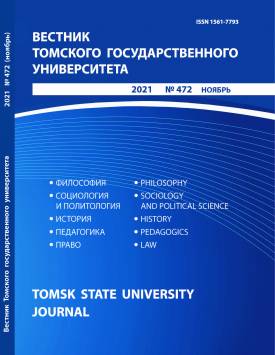Moderate Foundationalism in Husserl's Phenomenology
The article deals with the problem of knowledge justification in Husserl's phenomenology. The author of the article shows that, in the matter of justification of knowledge, Husserl's phenomenology does not fully meet the requirements of either foundationalism or coherentism. The fundamentalist way of reasoning assumes the presence of basic beliefs, from which all inference beliefs are derived. One of the most paradigmatic examples of foundationalism is the Cartesian “cogito ergo sum”, and it is this kind of justification that is present in phenomenology. However, the Cartesian method of justification is accepted by Husserl in a truncated form: the ego is the source of apodictic evidence, but it cannot guarantee the adequacy of subsequent conclusions. In this regard, the author of the article comes to the conclusion that Husserl is a moderate foundationalist in the matter of knowledge justification. In search of an explanatory principle for such a position, a hypothesis is expressed about the asymmetry between epistemological and ontological approaches to the interpretation of the ego's experience in Husserl's phenomenology. A non-epistemic understanding of the ego's experience presupposes the recognition of the obviousness of the existence of the ego as a thinking instance, while an epistemic understanding concerns all peripheral superstructures of the ego, which, in fact, are inferential knowledge from the basic belief given by the formulation cogito ergo sum. The presence of these restrictions forced Dagfinn Follesdahl to qualify Husserl's phenomenology as a kind of coherentism. The author of the article objects to this, believing that phenomenology cannot be considered either as a form of coherentism or as a form of (strong) foundationalism. Based on William Alston's thesis on the combination of epistemic and non-epistemic beliefs in a rethought type of foundationalism and on the works of LLaurence BonJour, the author of the article comes to the conclusion that Husserl's phenomenology should be understood as moderate foundationalism. The specificity of phenomenology -its appeal to the experience of the transcendental ego - leads to the fact that the pre-predicative structures of consciousness become the criterion of validity as such. Thus, moderate foundationalism in phenomenology boils down to the fact that Husserl recognized the undoubted evidence of the non-epistemic experience of the ego experience and, on the other hand, saw the possibility of correcting epistemic beliefs that do not affect the fundamental nature of the non-derivative basis.
Keywords
Husserl, phenomenology, foundationalism, coherentism, moderate foundationalism, epistemology, basic beliefsAuthors
| Name | Organization | |
| Berdaus Svetlana V. | Institute of Philosophy and Law, Siberian Branch of the Russian Academy of Sciences | s.berdaus@yandex.ru |
References

Moderate Foundationalism in Husserl's Phenomenology | Vestnik Tomskogo gosudarstvennogo universiteta – Tomsk State University Journal. 2021. № 472. DOI: 10.17223/15617793/472/2
